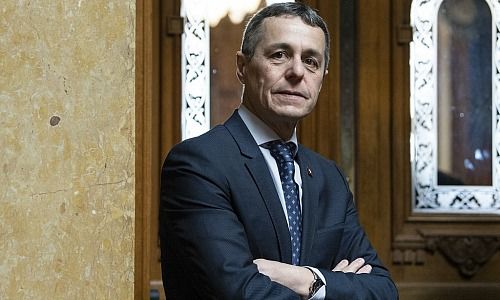Swiss Foreign Minister Ignazio Cassis stresses the need for an integrated foreign policy that takes the needs of domestic actors into account. In an interview with finews.com, Cassis also reveals what he personally expects from Swiss banking.
The Swiss Federal Department of Foreign Affairs (FDFA) in July published a working paper on the future of foreign policy (AVIS28). The document proposed giving economic policy a stronger role within the country's foreign policy. Foreign Minister Ignazio Cassis explained the government's intentions in an exclusive interview with finews.com.
Ignazio Cassis, the working paper AVIS28 puts its emphasis on a «Whole-of-Switzerland» approach for the country's foreign policy. What are the implications of this approach?
A solid and effective foreign policy has to take account of the positions of domestic players as well, which means the whole of Switzerland – government, parliament, cantons, science and think tanks, international Geneva, NGOs, and population. I have often said: foreign policy is internal politics! You have to look at what is happening in your country and take it into consideration.
«In this way, we strive for a more focused, integrated and agile foreign policy»
But to be better understood and supported you also have to explain what you are doing. Nowadays, foreign policy also has to be supported domestically. That’s the aim of the AVIS procedure: launching and widening a dialogue, involving all interest groups and integrating their opinions and concerns. In this way, we strive for a more focused, integrated and agile foreign policy, enabling us to meet the challenges of our time.
The economy is taking more of a center stage in the realignment of Swiss foreign policy. Why is that?
Foreign economic policy has always been part of foreign policy. The network of representations has an important role to play. Our offices worldwide are contributing to the visibility of Switzerland. They act as platforms through which information about products, knowledge and innovation power of Switzerland are disseminated. Our representative offices often also act as points of contact for companies. They are an important interface for the economy.
Technological change and growing geopolitical tensions are presenting the economy with big challenges: competition is getting harder, access to markets more demanding. We are aware of the challenges and are taking them into account in our foreign policy considerations. The reopening of the Swiss consulate general a month ago in Chicago, a boom region in the U.S., is a good example for this strategy.
How much are elements going to influence foreign policy that causes disruption for business, such as technology, media, and communication?
New technologies will probably be the most important drivers of change in the coming years. How can we adjust to this? The question is valid and also part of AVIS28: to envisage the world of tomorrow and to articulate our vision. Communication is a key requirement for the better interweaving of foreign and domestic policy.
«Communication is gaining in importance as an instrument of preserving our interests»
On the one hand, it is a question of getting stronger support for foreign policy domestically by explaining it in plain words. On the other hand, communication is gaining in importance as an instrument of preserving our interests in foreign policy. The way that Switzerland is being perceived abroad influences its scope for action and its attractiveness as a place to live and do business in.
What's the importance of the Swiss financial market for the positioning of Swiss foreign policy?
Swiss International Cooperation advocates the use of innovative forces and the expertise of the private sector for sustainable development.
Sustainable finance, the integration of environmental, social and governance criteria in financing and investment decisions, improves the chances of putting into practice the agenda 2030, to which Switzerland committed itself to the international community. We now have to gather our forces and the Swiss financial market can – and should – take a leading role in this.
«It is a priority to safeguard and improve the access to markets for Swiss financial services»
The Swiss government has made it a priority to safeguard and improve the access to markets for Swiss financial services companies in the framework of the financial market policy report (October 2016), in a bid to emphasize the importance of the financial market within foreign policy.
What is your personal relation to Swiss banks?
I entrust them with my money without hesitation. Seriously: banks (and insurers) are playing a significant role in creating value in Switzerland and they have a big importance as employers and taxpayers. Switzerland is as strong as the banks are. When they get into trouble it has a worrying effect on the whole country.
«Swiss banks should communicate clearly and embody corporate social responsibility»
To make me feel positive, it is important to me that a Swiss bank stands for Swiss values and represents those against the outside. It should furthermore clearly communicate and embody corporate social responsibility. I also wish that a bank participates actively in society and direct democracy, for instance by contributing constructively in the process of finding political solutions.
I also appreciate it if a Swiss bank informs simply and clearly about its services on the Internet. The e-banking solution has to be customer-friendly and – above all – secure. For more demanding things such as mortgages or asset allocation, I, of course, attach importance to professional, personal advice geared toward my needs.
Ignazio Cassis 58, was elected to the seven-member Swiss government on September 20, 2017. The member of the Radical Party (FDP) became foreign minister on November 1 of the same year. Before his election to the government, Cassis headed the parliamentary group of his party for two years. Cassis concluded his training as a medical doctor in 1988. He later specialized in internal medicine, prevention and the health sector as a whole. Cassis also has a Master's degree in health policy.



































